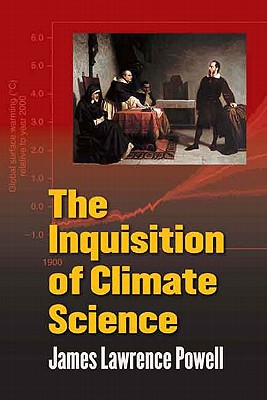

| THE INQUISITION OF CLIMATE SCIENCE James Lawrence Powell New York: Columbia University Press, August 2011 |
Rating: 5.0 High |
|||
| ISBN-13 978-0-231-15718-6 | ||||
| ISBN-10 0-231-15718-5 | 232pp. | HC/GSI | $27.95 | |
The author, a former geology professor, has written a number of popular science books on questions such as "How did the twentieth-century revolutions in geology—deep time, plate tectonics, and meteorite impact—come about, and what took them so long?" With respect to the present volume, he writes:
"This book is about another question: why, when the scientific evidence for global warming is unequivocal, does only half the public accept that evidence? What has caused so many to doubt the conclusions of scientists, whom the public usually trusts, on such an important issue? In trying to answer that question, I have come to believe that in the denial of global warming, we are witnessing the most vicious, and so far most successful, attack on science in history. Never were the words of Thomas Jefferson so apt: 'If a nation expects to be ignorant and free, in a state of civilization, it expects what never was and never will be.'" – Page xiii |
He then spends several chapters on the history of how we learned about the factors that affect Earth's climate, including Milankovich cycles and the so-called greenhouse gases. If you read nothing else in this book, read Chapter 6. Its three pages tell you very succinctly why you need to be concerned.
After that, he dives into the fray, identifying several of the principals among three groups who cluster under the denier tent. Chapter 7 focuses on scientists. Those who follow the dispute will know most of their names already: Arthur B. Robinson, S. Fred Singer, Frederick Seitz, Richard Lindzen, Harrison Schmitt, Freeman Dyson. Chapter 8 turns to non-scientists, mentioning Tim Ball, Christopher Monckton, and Steve Milloy. Then, in one of the most valuable chapters in the book, think tanks are the subject of Chapter 9, "Toxic Tanks." A highlight of this chapter is its coverage of a 1995 report by L. C. Bernstein, a Mobil Oil Company chemical engineer. The report, written for the Global Climate Coalition, soundly debunked the contrarian positions of people like Patrick Michaels (pages 96-7). Equally noteworthy is the comment of William Clay Ford Jr, chairman of Ford Motor Company, explaining why he pulled Ford out of the GCC: "The present risk is clear. The climate appears to be changing, the changes appear to be outside natural variation, and the likely consequences will be serious. From a business planning point of view, that issue is settled. Anyone who disagrees is, in my view, still in denial." (page 95)
Chapter 10 covers ExxonMobil, currently the world's most profitable company (in terms of absolute dollar amount),1 and examines its continuing funding of certain denier organizations. It then explains why reinsurance firms (the "industry to trust") should be relied upon as corporate indicators of the seriousness of global warming.
News media and their penchant for false balance in covering scientific matters are the subjects of Chapter 11. In Chapter 12, the author returns his focus to science and debunks ten of the most commonly used arguments against the reality or potential impact of global warming. The remaining chapters discuss the sociopolitical aspects of the problem: The "hoax" claim of Inhofe and others; "ClimateGate" (more appropriately labeled "SwiftHack") and related "-gates"; and Denialist tactics in general.
The final chapter is a plea for trust in science. Note carefully: Dr. Powell is not asking the public to return to trusting a scientific establishment which temporarily let its reliability slip and is trustworthy again. He asks us to understand that science has been trustworthy all along. Actually, I think he puts it better than I can:
"There is not a shred of evidence that scientists have lied about global warming. The positive evidence for global warming is overwhelming and irrefutable. To distrust science and scientists now, for no good reason and at the very moment they warn of the greatest threat ever to face humanity, is to abandon reason and our uniquely human ability to imagine the future." – Page 189 |
The Inquisition of Climate Science is not the only book which explains why neither the scientific nor the political attacks on the climate change consensus have merit, so I won't call it a "must read." It is, however, clear, comprehensive, and well organized; it does a convincing job. The jargon-free text reads easily and is supplemented by four well-chosen charts. An Appendix lists the academies of science of all the nations that have issued statements accepting global warming, and the national and international organizations that have done the same. The index is good. Chapter notes are provided, and there is a Bibliography extending over seven pages. The book does contain some errors, but these do not diminish its value. Dr. Powell has followed the dispute closely over the years, and he supplies some details I have not seen anywhere else. His addition to the popular literature on climate change is worthy of top marks.

 To contact Chris Winter, send email to this address.
To contact Chris Winter, send email to this address.